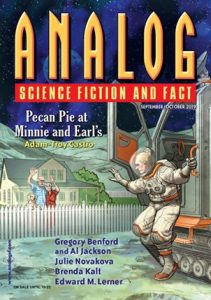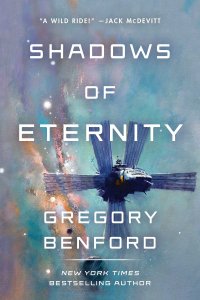Rich Horton Reviews Short Fiction: Analog, Asimov’s, and f(r)iction
 Analog 9-10/19
Analog 9-10/19
Asimov’s 9-10/19
f(r)iction Spring ’19
The cover story in the September-October Analog is “The Gorilla in a Tutu Principle; or, Pecan Pie at Minnie and Earl’s“, a novella from Adam-Troy Castro, the third in his series about the era of lunar colonization, and how the very unusual couple Minnie and Earl helped out. Castro is partly having fun with Analog expectations, because these stories, featuring engineers and technicians building a lasting colony on the Moon, feature an old couple who live in a house behind a white picket fence on the Moon’s surface, sans pressure suits or any other overt space tech. (I am reminded just a bit of Bradbury’s “Mars Is Heaven!”) (Castro assures us that there’s an explanation for them, and that he’s given us all the clues we need.)
At any rate, the current entry is told by Ben Turpin, a no-nonsense engineer who, investigating the apparent malfunction of a camera on one of the Lunar rover routes, sees something unbelievable: a pair of men he doesn’t know, one tall and skinny, one short and stout, in unorthodox moonsuits and bowler hats, trying to manhandle a crate up a hill, with unfortunate results. Turpin hustles to where they are, and they disappear. The reader (of a certain age) will have recognized Laurel and Hardy, but Turpin doesn’t. Unsurprisingly, nobody believes him when he tells his story, but Turpin keeps investigating, and, with Minnie and Earl’s help, eventually gets a chance to find some answers – when something much more important intervenes. Castro plays some tricks with story structure and our need for resolution, but there is a story here about Ben Turpin and a woman he likes, about how the Moon was won (sort of), and about Laurel and Hardy too. And if we don’t get all the answers Ben Turpin thinks we want, we get the answers the story needs. It’s entertaining and ultimately rather moving, too.
In truth nothing in the rest of the issue really thrilled me, though Michael Flynn‘s “The Singing City” and Joe M. McDermott‘s “Astroboy and Wind” both use well-depicted SF milieus to tell solid character stories (Flynn’s about a man’s thoughts about his father, a war hero and space pilot, and his son, just about to leave on a mission to Saturn, while he himself is just a schoolteacher with a failing marriage; and McDermott’s about a woman working the “high steel” (not his term) on a colony a-building in the Alpha Centauri system, and her friends and how they are affected when one of them falls to his death – or did he jump?). Finally, a writer new to me, Guy Stewart, offers “Road Veterinarian“, about a veterinarian kidnapped by the government to help them understand how to deal with a “living road” that is heading to Canada. Lots of ideas here, both political and speculative, and a couple of intriguing leads – the vet himself and the genetically engineered woman soldier who has “recruited” his help. Alas, the story doesn’t quite make everything work together, but it was a nice read, and sets up an interesting future.
There’s a big novella in Asimov’s as well, “Winter Wheat“, by Gord Sellar. This follows about a decade in the life of Jimmy, a farmer’s son in Saskatchewan in the very near future. Jimmy is an interesting choice as viewpoint character – in a way he does less than the people around him – he’s not brilliant like his Dad or the girl he falls for, and he’s not much motivated to be politically active. (But he does like hockey!) The central conflict in the story concerns genetically modified wheat, and how this impacts farmers and the land and everything. Jimmy grows up, not quite understanding, while his Dad tries to resist the corporations pushing the modified wheat, and starts to work on alternatives. The issues here are fascinating and important, though for me the thread about evil corporate actions (which are real, don’t get me wrong) threatens to obscure the more interesting questions about the benefits and dangers of genetic modification done without malevolent intent.
Andy Duncan‘s “Charlie Tells Another One” is in one of Duncan’s favorite modes – American folklore, essentially, with wholly believable realistic backgrounding. Charlie tells how he learned the banjo, while we learn of his childhood in a company town, with the grinding poverty and dangerous conditions of the mills. Charlie becomes fascinated with the music played by a local man who lives out of the company town and cajoles the man into teaching him. He learns something mysterious about the songs the man sings. Sometimes they seem to tell the future, and that’s not always a great thing. But Charlie persists, and gets very good. But how did he get great? I think I might know the answer – it has to do with his mangled hand – but Charlie has a number of stories, featuring characters like the angry father of a pretty girl, or the devil, or… They’re all worth hearing!
I also really like “At the Old Wooden Synagogue in Janower Street” by Michael Libling, about a young boy sometime in the post-War period, whose parents escaped the Nazis to come to the US. One day an odd trio comes into his father’s store, dressed in old-fashioned clothes, and we soon realize they are the ghosts of his father’s parents and sister. His father’s memory of that terrible time in Poland leads to a truly wrenching conclusion.
f(r)iction is an interesting, and very good-looking, literary magazine with an apparent dedication to publishing what they call “the weirdest stories from this and other worlds.” I saw the Spring issue, and there’s a lot of nice work there. I liked “Snarglefox” by Vaughn Gaston best – about a cruel Lord of a somewhat medieval-seeming castle, who serially takes women from the local village and abuses them for a few days before killing them. He is accompanied by the title creature, which only he sees, and which urges him on to greater crimes. The story follows several people who oppose his rule, ineffectually, until a new village girl takes a different tack.
Recommended Stories
“The Gorilla in a Tutu Principle; or, Pecan Pie at Minnie and Earl’s”, Adam-Troy Castro (Analog 9-10/19)
“Charlie Tells Another One”, Andy Duncan (Asimov’s 9-10/19)
“At the Old Wooden Synagogue in Janower Street”, Michael Libling (Asimov’s 9-10/19)
“Winter Wheat”, Gord Sellar (Asimov’s, 9-10/19)
Rich Horton works for a major aerospace company in St. Louis MO. He has published over a dozen anthologies, including the yearly series The Year’s Best Science Fiction and Fantasy from Prime Books, and he is the Reprint Editor for Lightspeed Magazine. He contributes articles and reviews on SF and SF history to numerous publications.
This review and more like it in the October 2019 issue of Locus.
 While you are here, please take a moment to support Locus with a one-time or recurring donation. We rely on reader donations to keep the magazine and site going, and would like to keep the site paywall free, but WE NEED YOUR FINANCIAL SUPPORT to continue quality coverage of the science fiction and fantasy field.
While you are here, please take a moment to support Locus with a one-time or recurring donation. We rely on reader donations to keep the magazine and site going, and would like to keep the site paywall free, but WE NEED YOUR FINANCIAL SUPPORT to continue quality coverage of the science fiction and fantasy field.







